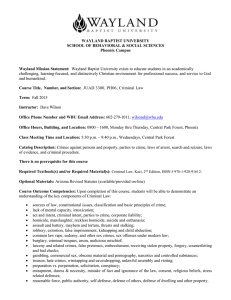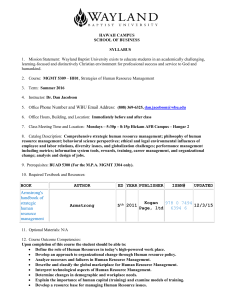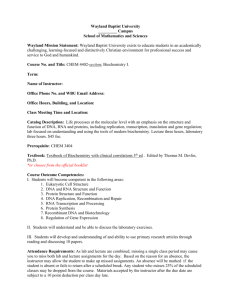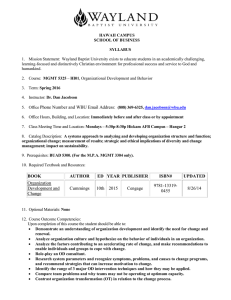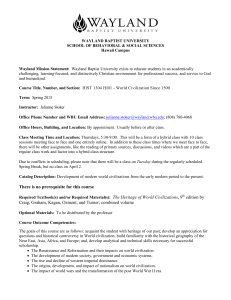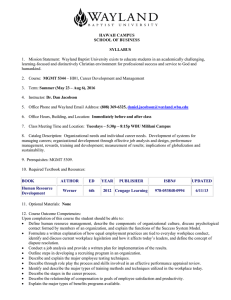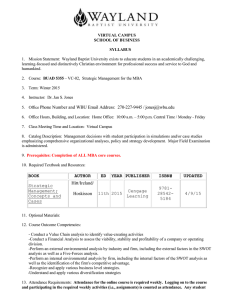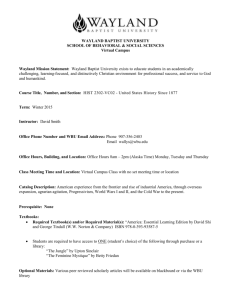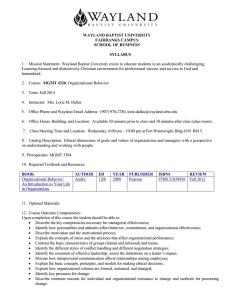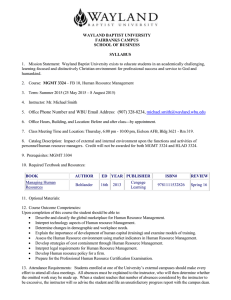Document 10405213
advertisement
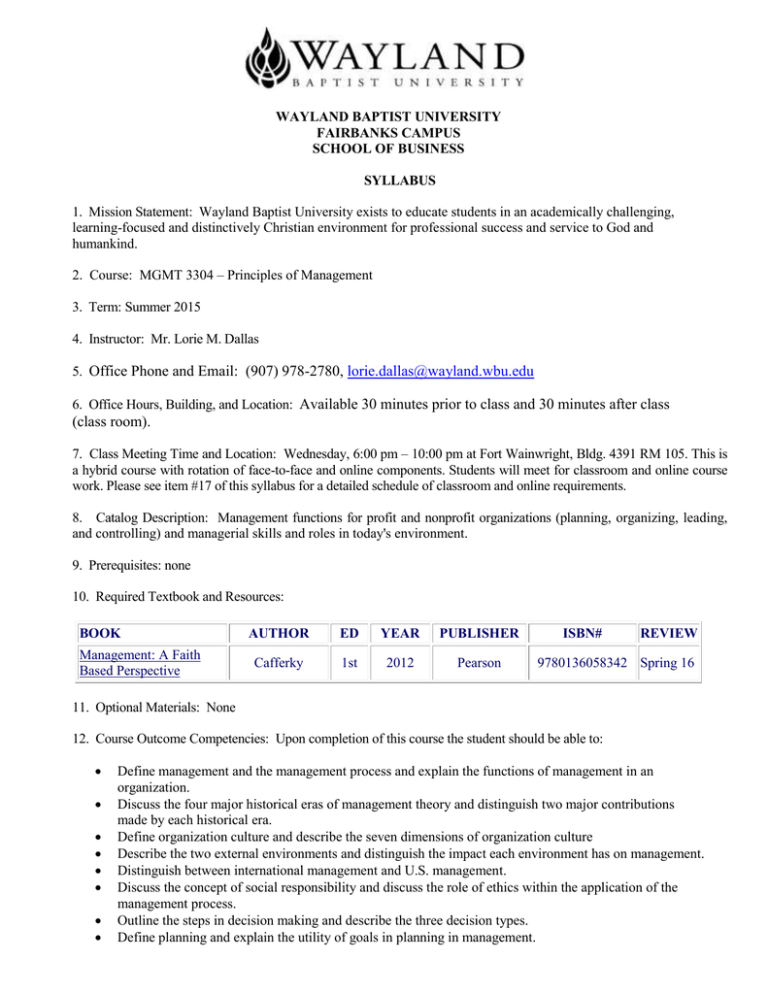
WAYLAND BAPTIST UNIVERSITY FAIRBANKS CAMPUS SCHOOL OF BUSINESS SYLLABUS 1. Mission Statement: Wayland Baptist University exists to educate students in an academically challenging, learning-focused and distinctively Christian environment for professional success and service to God and humankind. 2. Course: MGMT 3304 – Principles of Management 3. Term: Summer 2015 4. Instructor: Mr. Lorie M. Dallas 5. Office Phone and Email: (907) 978-2780, lorie.dallas@wayland.wbu.edu 6. Office Hours, Building, and Location: Available 30 minutes prior to class and 30 minutes after class (class room). 7. Class Meeting Time and Location: Wednesday, 6:00 pm – 10:00 pm at Fort Wainwright, Bldg. 4391 RM 105. This is a hybrid course with rotation of face-to-face and online components. Students will meet for classroom and online course work. Please see item #17 of this syllabus for a detailed schedule of classroom and online requirements. 8. Catalog Description: Management functions for profit and nonprofit organizations (planning, organizing, leading, and controlling) and managerial skills and roles in today's environment. 9. Prerequisites: none 10. Required Textbook and Resources: BOOK Management: A Faith Based Perspective AUTHOR ED YEAR PUBLISHER Cafferky 1st 2012 Pearson ISBN# REVIEW 9780136058342 Spring 16 11. Optional Materials: None 12. Course Outcome Competencies: Upon completion of this course the student should be able to: Define management and the management process and explain the functions of management in an organization. Discuss the four major historical eras of management theory and distinguish two major contributions made by each historical era. Define organization culture and describe the seven dimensions of organization culture Describe the two external environments and distinguish the impact each environment has on management. Distinguish between international management and U.S. management. Discuss the concept of social responsibility and discuss the role of ethics within the application of the management process. Outline the steps in decision making and describe the three decision types. Define planning and explain the utility of goals in planning in management. Diagram the strategic management planning process and differentiate between corporate and functional strategic plans. Describe the application of planning tools in goal setting and planning. Define communications and explain the nature of formal and informal communications within an organization. Discuss the functional role of human resource management in strategic planning and organizing List and describe techniques for reducing resistance of organizational members to change and two techniques for reducing members stress to change. 13. Attendance Requirements: Students enrolled at one of the University’s external campuses should make every effort to attend all class meetings. All absences must be explained to the instructor, who will then determine whether the omitted work may be made up. When a student reaches that number of absences considered by the instructor to be excessive, the instructor will so advise the student and file an unsatisfactory progress report with the campus dean. Any student who misses 25 percent or more of the regularly scheduled class meetings may receive a grade of “F” in the course. Additional attendance polices for each course, as defined by the instructor in the course syllabus, are considered a part of the University’s attendance policy. 14. Statement on Plagiarism and Academic Dishonesty: Wayland Baptist University observes a zero tolerance policy regarding academic dishonesty. Per university policy as described in the academic catalog, all cases of academic dishonesty will be reported and second offenses will result in suspension from the university. 15. Disability Statement: “In compliance with the Americans with Disabilities Act of 1990 (ADA), it is the policy of Wayland Baptist University that no otherwise qualified person with a disability be excluded from participation in, be denied the benefits of, or be subject to discrimination under any educational program or activity in the university. The Coordinator of Counseling Services serves as the coordinator of students with a disability and should be contacted concerning accommodation requests at (806) 291- 3765. Documentation of a disability must accompany any request for accommodations.” 16. Course Requirements and Grading Criteria: Students shall have protection through orderly procedures against prejudices or capricious academic evaluation. A student who believes that he or she has not been held to realistic academic standards, just evaluation procedures, or appropriate grading, may appeal the final grade given in the course by using the student grade appeal process described in the Academic Catalog. Appeals may not be made for advanced placement examinations or course bypass examinations. Appeals are limited to the final course grade, which may be upheld, raised, or lowered at any stage of the appeal process. Any recommendation to lower a course grade must be submitted through the Executive Vice President/Provost to the Faculty Assembly Grade Appeals Committee for review and approval. The Faculty Assembly Grade Appeals Committee may instruct that the course grade be upheld, raised, or lowered to a more proper evaluation. Course Requirements and Grading Criteria: Readings: Assigned readings are to be completed prior to the class session for which they are assigned. Exams: Examinations will consist of a Midterm and a Final Exercises/Discussion Board Assignments: This session there will be four assignments through blackboard. Each student will be required to respond to the question and to two fellow students’ postings. PPT/Oral Presentation: Prepare a presentation on one of the Course Competencies listed in #12. Should be 7 to 10 slices, 10 – 15 minutes in length. Course Requirements and Evaluation – Writing, Oral, and Visual Presentations will be scored using the School of Business/Management Scoring Rubrics. o Exercise/Discussion Board: (20 points per discussion board assignment for a maximum of 80 points) o PPT/Oral Presentation (20 points) o Mid-Term (100 points) o Final (100 points) o PPT/Oral Presentation (20 points) o Participation (10 points per class for a maximum of 100 points) The University has a standard grade scale: A = 90 – 100, B = 80 – 89, C = 70 – 79, D = 60 – 69, F = Below 60. 17. Tentative Schedule: (Calendar, Topics, Assignments) Week One May 27 Classroom Two Jun 3 Blackboard Three June 10 Classroom Four Jun 17 Blackboard Five June 24 Classroom Six Jul 1 Blackboard Seven Jul 8 Blackboard Eight Jul 15 Classroom Nine Jul 22 Blackboard Ten Jul 29 Classroom Eleven Aug 5 Classroom Subjects/Concepts Introductions and Syllabus Discussion of Chapters 1 & 2 Assignment Due by Chapters 3 & 4 Exercise/Discussion Board Assignment 8 June 2015 Discussion of Chapters 5 & 6 Mid-Term (Chap 1thru 6) MIDNIGHT 17 June 2015 Discussion of Chapters 7 & 8 Assign PPT Discussion Chapters 9 & 10 Exercise/Discussion Board Assignment 6 July 2015 Discussion Chapter 11 Exercise/Discussion Board Assignment 13 July 2015 Discussion Chapter 12 & 13 Discussion Chapter 14 Exercise/Discussion Board Assignment 27 July 2015 Discussion Chapter 15 PT Presentations Due 29 July 2015 Final Exam 5 Aug 2015 18. Additional information as desired by the faculty member.
